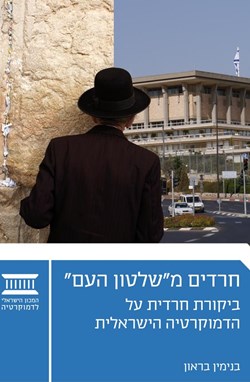Trembling at the Word of the People
Haredi Critique of Israeli Democracy
- Written By: Prof. Benjamin Brown
- Publication Date:
- Cover Type: Softcover |Hebrew
- Number Of Pages: 122 Pages
- Center: Religion and State Program
- Price: 64 NIS
What do Haredim have against democracy? Many have no problem with it and are pleased to live in a democratic country and enjoy its benefits. Some of their spokespeople, however, express harsh criticism of democratic rule in general and Israeli democracy in particular. In this book, Dr. Benjamin Brown explores these claims and the question of whether they pose an authentic threat to Israeli democracy.
What do Haredim have against democracy? Many have no problem with it and are pleased to live in a democratic country and enjoy its benefits. Several of their spokespeople, however, express harsh criticism of democratic rule in general and Israeli democracy in particular.
Haredi criticism of Israeli democracy maintains that a regime that does not adhere to Torah law cannot be legitimate, as Judaism believes that God is sovereign, not the people. Haredim perceive the fundamental principles of democracy—that effectively constitute the basic values of Western culture as a whole—to be invalid from the perspective of Judaism, especially the value of freedom. The masses cannot be trusted, they claim. Hence, all major decisions should be left to Torah sages. Beyond these lofty pronouncements, however, Haredim frequently criticize those whom they identify as the living representatives of democracy—the judicial and law enforcement systems (especially the Supreme Court), the media and the secular left. The Haredi press constantly avows that Israeli democracy is nothing but a tool in the hands of these powers, that distort and manipulate its principles as they please.
A terrifying threat? A danger to democracy? Not necessarily. Several of these claims are well-grounded and relevant and may prove useful in "cleaning house" and improving Israel's ruling system. Others are primarily rhetorical and even Haredim themselves take them with a grain of salt. One way or the other, Haredim offer no real alternative to the present system of government and their claims are more of an intellectual challenge than an authentic political threat.
Haredi literature and the Haredi press have been criticizing Israeli democracy for several decades. Some of their claims address democracy in principle: sovereignty of the people, the fundamental values of democracy—especially freedom, but also equality and the public's ability to decide fateful issues. Other claims are of a more concrete nature, seeking to demonstrate that the principles of democracy are applied selectively in the State of Israel, according to the interests and even the whims of its "knights of democracy"— the liberal and secular left. These claims share a common underlying assumption and fundamental premise: Democracy is perceived as a tool that is manipulated and misused by the ruling elites. Pointed attacks on Israel's system of government are expressed constantly from influential platforms in the Haredi world.
The Haredim themselves almost never attempt to present their position to the secular or national religious public. They do not fear slaughtering the sacred cows of secular Israel, yet are apprehensive about doing so right before the eyes of those who "worship" those cows. Consequently, Haredi "external" discourse is often characterized by an apologetic tone that attempts to convince the listener on the basis of his own biases. The examination of the Haredi "internal" discourse opens, therefore, a window to claims that usually do not reach the non-Haredi readers, even though they are aimed at them. The extensive and concentrated presentation of Haredi criticism of democracy confronts the reader with its internal logic, one based on premises alien to the listener's world, but cogent nevertheless. The multiplicity of its claims exerts a cumulative effect, clarifying an alternative thinking system existing both within and without Israeli society.
The sharp critiques expressed by Haredi spokespersons may lead some to fear that the Haredi public constitutes a threat to democracy. The book rules out this option. Haredim do not want to replace the existing political system in Israel, nor do they offer any real alternative to it. To a great extent, they too have internalized the current style of government and could not imagine life in a non-democratic political system. Criticism of democracy is simply part of the counterculture role that Haredi Judaism has assumed. It is precisely for this reason that some of its claims (although not all of them) should be taken seriously. They elucidate not only the nature of the social sector in which they originate—whose representation in the Israeli polity is rising steadily—but also they represent serious criticism that places a mirror before Israeli democracy and raises points for examination and rectification.

